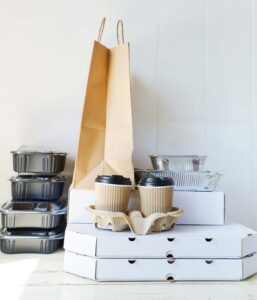Can Maine restaurants get reusable packaging ‘to go’?

Graduate Researcher Jared Wildwistle and Dr. Cindy Isenhour study the feasibility of reusable take-out packaging in Maine
By Nathan Poole
The thrift store in your local church’s basement might be doing more for the community than saving families from spending $40 for jeans. Not only can systems of reuse, like thrift stores, reduce waste, they strengthen bonds between neighbors and make communities more resilient to hardship.
“Anytime we see any sort of big economic or cultural shock, a lot of times traditional supply chains are broken,” Dr. Cindy Isenhour said. “But when you have more localized and resilient systems for procurement, they can help you weather those storms.”
Isenhour, Associate Professor of Anthropology and Climate Change at the University of Maine, studies the way that people think about and deal with material waste. With funding from the Senator George J. Mitchell Center for Sustainability Solutions, she and Jared Wildwistle, a graduate of UMaine’s Master’s in Business Administration and Ecology and Environmental Science programs, have been studying the feasibility of a different kind of reuse system in Maine: reusable take-out packaging.
Isenhour served as Wildwistle’s advisor as he pursued dual master’s degrees. Before enrolling at UMaine in 2020, Wildwistle was a brewer, co-founding Flight Deck Brewing in Brunswick. He saw first-hand how the pandemic exacerbated the difficulty of being economically and environmentally sustainable in the food-service industry. Finding sustainable product options for restaurants became one of his goals, and the pandemic was a powerful motivation for looking to reuse systems for solutions.
“It was the beginning of the pandemic, and you heard all these stories about mounting piles of single-use plastics … that problem was front and center in my mind at the time,” he said.
Reduce, Reuse. Full Stop.
Even before the pandemic, waste production had reached all-time highs due to jumps in online retail and food delivery. In the U.S., disposable packaging makes up roughly 36% of municipal waste streams, and 78% of that disposable packaging can be sourced to food service industries. While many restaurants and fast-food chains have shifted to biodegradable or recyclable packaging, they can be difficult to dispose of properly and do nothing to reduce the overall strain on the nation’s waste management systems.
As these economic and environmental problems reared their heads in 2020, Isenhour and Wildwistle saw the pandemic as an opportunity to investigate whether reusability could succeed in reducing the amount of single-use packaging in the waste stream, thereby alleviating struggles with recycling and composting.

“All of my projects try to tackle waste, but they don’t try to do it from the backend where we’re just dealing with products that are already wasted,” Isenhour said. “We’re trying to move up that production chain and change the way that products are designed and change the way that people interact with new products.”
Gaining a well-rounded understanding of the impacts that a shift to reusable packaging in restaurants would create is a lot for a professor and graduate student to wrap their heads around. Both Isenhour and Wildwistle are members of the Materials Management Research Group, an interdisciplinary team established by the Senator George J. Mitchell Center for Sustainability Solutions to study and address the economic, cultural, and environmental problems that stem from modern systems of extraction, production, and disposal. Wildwistle noted that the project wouldn’t have been possible without input from the group’s members, which includes professors of economics, engineering, nursing, business, and sociology.
“Having those connections, having that base of knowledge to draw from was invaluable, and the way that they think about things really helped me process what was going on in our project and in the state of Maine,” he said.
“Yankee Ingenuity”
Wildwistle and Isenhour’s work generally consisted of conducting surveys and workshops with representatives from waste management industries, restaurants, and municipal and regional planning commissions to get their perspectives on the difficulties with implementing reusable systems. Additionally, Isenhour and Wildwistle planned to facilitate pilot programs with restaurants and municipalities to better understand what it takes to get a reusable packaging system off the ground, culminating in an online resource guide for those looking to implement similar programs in the future.
The researchers approached the project with a hunch that Maine might be a particularly fertile environment in which reusable packaging systems could thrive. Reusable food service products and services have begun to emerge in cities like Boston and San Francisco, and while Maine is a far cry from those communities, Isenhour said that it might have an advantage in other ways.
“Maine has this really strong thrift mentality and a real aversion to waste; so, we thought, culturally, reusable products might make a lot of sense here and people might really adopt the concept,” she said.
Wildwistle said that a friend of his characterized Maine and its citizens as evoking a northern spin on “Yankee Ingenuity.”
“It’s a different way to doing things, to make use of what you have. I think that’s one thing that Mainers all have in them, and I think that lends itself to reuse systems,” he said.
This isn’t to say that the researchers didn’t anticipate challenges. Wildwistle said that the focus on tourism in Maine’s economy presents a significant obstacle, as the state draws in many people that would have to come to grips with these systems while on vacation. It’s much more challenging to get someone on board with returning their take-out packaging when they’re only in the state for a couple of days.
During a workshop, Maine restaurant owners, many of whom expressed interest in being more socially responsible and environmentally sustainable, raised lots of practical concerns about reusable systems related to logistics, incentives for customer participation, and municipal support. Wildwistle said that a lot of owners’ hesitancy is rooted in anxieties about making changes that don’t have precedents in the world around them. For instance, lots of owners wanted to know where they would keep a rotating surplus of packaging in already cramped kitchens. Wildwistle believes that lots of those fears can be dispelled through pilot programs.
The Best Made Plans…
There were very clear benefits and drawbacks to conducting the reusable packaging study at the height of the pandemic. The swiftly rising popularity of Zoom gave Wildwistle and Isenhour the flexibility to solicit input from restaurant owners and community partners from across the state. However, the economic challenges facing businesses also created barriers to participation. Lots of restaurant owners were interested in the project but needed to back out of meetings or workshops due to a COVID-19 outbreak or low staffing.
“These projects always end up a little bit different than you anticipate,” Isenhour said, laughing.
The Mitchell Center researchers were able to solicit enough participation in the workshops and surveys to develop a framework for a pilot program. However, when it came time to get a pilot off the ground in the summer of 2022, they could not find a restaurant with sufficient staffing to comfortably commit to participating.
Nonetheless, the project has not been without its successes. Most significantly, Wildwistle and Isenhour worked with members of the Center for Disease Control’s (CDC) Health Inspection Program to permit the implementation of reusable packaging in restaurants. Wildwistle said that they’d initially only intended to invite the CDC representatives to sit on the advisory board for the project, but during their early discussions it came to the representative’s attention that reusable packaging was not allowed in Maine. In October, 2021, this resulted in the CDC releasing an internal policy to all inspectors to abide by the federal food code with regards to reusable packaging.
An Optimistic Outlook

Another hugely positive outcome from the project is Wildwistle’s new professional role.
After completing his dual master’s degrees in 2022, Wildwistle was hired by the Gulf of Maine Research Institute to kickstart and manage the Climate Center’s Business Climate Action Program. The program is designed to work with businesses that rely on the ocean as they employ climate change adaptation and mitigation efforts. He’s only been in the position for about half a year, but Wildwistle is already hard at work on issues like decarbonizing the seafood harvesting industry. Additionally, he is continuing the effort to investigate the potential for reusable take-out packaging in Maine with a grassroots group. “The Portland Re-Users” is composed of representatives from local NGOs and Portland’s Sustainability Office and was founded by those members to support reusable solutions in Portland.
“Really, [working with GMRI] goes back to my original reason for going back to school, which is to try and bridge the gap between environmental sustainability and financial sustainability,” he said.
Additionally, Isenhour said that she has submitted grant proposals to support potential pilot programs with partners in Bar Harbor or South Portland. Both researchers said that they have become more optimistic about the potential for seeing reusable take-out packaging take-off someday in Maine.
“If we can get a successful pilot up and running in the next year and prove that concept, [reusable packaging] could come [to Maine] within three years,” Wildwistle said. “The concept isn’t that far away from us now.”
